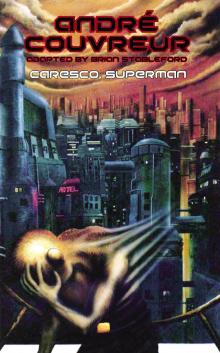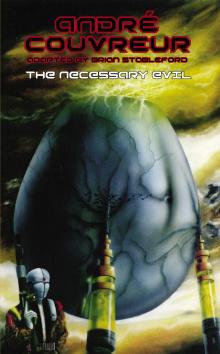- Home
- André Couvreur
The Exploits of Professor Tornada (Vol. 2) Page 6
The Exploits of Professor Tornada (Vol. 2) Read online
Page 6
As for me, my head spinning again under the influence of drink, I welcomed with a tender familial sympathy the feverish gestures with which Monsieur Danator punctuated his speech, and the facial tics that had caused me so much disquiet the previous evening. I thanked him for having given life to a son who would end up dissipating and replacing my disdained love for Marcel. Throughout the speech, my hand was magnificently enlaced with Adam’s, and it was thus united that we got up from the table to go into the flowery garden.
Marcel was about to follow us when Monsieur Danator held him back by the flap of his jacket.
“Stay here and wait until they’ve finished their stroll. Sit down…you’ll find newspapers…the stupidities of the day...”
In spite of my favorable dispositions toward Adam, I felt a slight anguish at being separated from my protector. It was a fleeting impression, however, dissipated by the amiability of Monsieur Danator when he drew us into the grounds, placing himself between us and leaning on our shoulders.
“No, no, my children,” he said, at the same time. “I won’t let you go alone. How do we know what might happen if Made abandoned herself to that rogue Adam before the day that I’ve fixed for their wedding arrived? That moment, believe me, has been mathematically planed. It will coincide with the legal consecration.”
“And religious,” I added.
“You want that?”
“But of course.”
“I don’t…but if you insist... What do you expect? I only believe in myself, since, in the eyes of the Church, I’m damned.”
He had a satanic air about him when he said that. His tics relaxed; the wrinkles in his forehead formed a redoubtable circumflex accent; the fire in his eyes reddened more intensely. He frightened me. I stepped backwards.
He understood my terror, and to dissipate it, he said: “Don’t worry, my daughter-in-law. Danator is damned à tort.15 It’s a pun.” Then, more imperiously, he said: “Don’t imagine, however, that I’m yielding to any moral consideration. All that’s farcical! Coercions that don’t stand up before a test-tube filled with saline solution. How it would astonish Monsieur le Maire and Monsieur le Curé to learn that life—once incompatible with the temperature of the Earth, but becoming possible once it had cooled—could surge spontaneously from the bosom of matter! Yes, it would certainly astonish those little puppets of the sash and the star, to direct their eyeglasses at an osmotic growth! So, I repeat, my children: it’s not those considerations that make me cry: ‘Wait! Wait!’”
He leaned over to whisper confidentially in my ear. “I’m telling you to wait, Made, because, although you’re disposed to creation by thousands of years of evolution, Adam isn’t yet physiologically ready, and I need another three weeks in order for him to acquire the necessary potency—just time enough to publish your banns. Come on! A little patience, and put a brake of the premature ardors that are blazing in your eye and making your bosom quiver. What’s three weeks, by caparison with Eternity?”
Moving his arm while he was speaking, he had gripped me by the waist and tapped my buttocks, like a stable-lad patting a mare. Combined with the breath of a slight cool breeze that was coming from the sea, that gesture sobered me up and I drew away from the singular preacher. Where had I gone wrong…?
“It must be time to go back to Saint-Jean-de-Luz,” I said. “I have a tea at four o’clock. Permit me not to miss it.”
“But of course,” Monsieur Danator agreed.
“But of course,” Adam endorsed, like an echo.
We returned to the house in single file. When we got there, Monsieur Danator telephoned the garage outside the property for the auto. Soon, the sumptuous limousine made the gravel squeak in front of the perron.
“Here we go! Au revoir! See you very soon! And patience…patience…” Monsieur Danator called to me.
Waved handkerchiefs continued to salute my departure from a distance. I was even obliged to reply to a kiss blown to me by my fiancé.
The car was soon on the road. Marcel remained silent. I would have welcomed a soothing word. He sensed that, but made no response. I was therefore obliged to raise my voice, and I put into it all the pleading of my heart. Oh, how gladly I would still have reached out my hand to him!
“That’s the first ordeal over, Marcel. May I ask your advice?”
“About what?”
“About a certain strangeness you doubtless observed in me, and which now make me hesitate as to the course of action to take.”
It was definitely a day on which I did not have the ability to interest him, however, for instead of replying, he was the one who asked: “So you don’t remember what Monsieur Danator did when we approached the iron door?”
“I had my back turned to him,” I snapped. “And to you too. I detest you! I detest you!”
III
It was evident to me, the next day, that for the people in my hotel I had become an object of curiosity, even more than envy. The news of my marriage to the wealthy Adam Danator, after having nourished the gossip of the lounge, spread to the servants’ parlor, was deformed there, and climbed the stairs again, to reach my apartment via the mouth of my chambermaid.
“Does Mademoiselle know what people are saying?”
“What are they saying, Irma?”
“That Mademoiselle is marrying a phenomenon...”
“A phenomenon?”
“Yes, a fish-man.”
“That’s true, Irma. You can even affirm, to those who ask you for more precise information, that my fiancé has received a magnificent offer from an impresario to perform in an aquarium in Chicago. To be precise, the sum of three hundred thousand dollars has been mentioned, and I shall man the turnstile.”
That ludicrous invention, which the maid accepted without flinching, was, in sum, merely translating a new and frivolous state of mind from which I had benefited since returning from lunch with Marcel. Was it the consequence of the fortunate future that was opening before me, or the sentiment that I had acquired of liberating myself from my friend in order to gravitate toward my husband? I had difficulty pinning it down, but it’s certain that I had completed a stage of happiness that morning and was fully inclined to look at destiny in it best light. As people often used to say before the war, “there’s nothing I can do about it.”
So, when I appeared at lunch, after idling away the morning in my room, wearing my most ravishing summer dress, a darling tunic in white lawn with pink spots, and all gazes turned toward me with a persistence in which I divined as much malevolence as admiration, I weathered the assault with a good grace that disconcerted the critics.
Before going to the table that was reserved for me, I stopped at a few others and distributed bonjours. The gentlemen, who normally stood up to chat to me, remained riveted to their chairs this time. Further on, a retired general, fervent about my beauty, who usually adopted a military stance in order to salute me, did not deign to raise his head from the menu he was consulting. Then there was a group of flirtatious old women, whose pampered pet I had once been, and who scarcely responded to my smile.
None of that bothered me. I sat down tranquilly and attacked the hors-d’oeuvres. From the abundantly-supplied plate I mostly selected crustaceans and condiments: a new predilection for comestibles that I had previously neglected, preferring lightly seasoned vegetables; an unconscious memory of the pleasure procured by the meal at the Danators. These seemed insipid to me, however, and I ate them without enthusiasm.
I was, at any rate, conscious of the things that I am obliged to record, since I have sworn to be frank with myself regarding this past, and my indulgence came from the fact that I was no longer mistress of my own mind, but under the influence of a diabolical power tending to modify my nature completely, which had succeeded in so doing.
As I have already said, I had retained, in spite of a nomadic life that frequently constrained me to the observation of dissolute mores, a healthy and proud mentality, and I guarded, as the most beautiful flowe
r of my youth, not only a bodily purity but also a purity of thought. However, I surprised myself that morning by casting my eye over the masculine element of the dining room more than was appropriate.
One young man, in particular—a scintillating Aragonese, with hair the color of a raven’s wing, a conquistador’s moustache and hairy hands, became the object of my secret commentaries. I knew that he was a foreigner devoid of fortune and definite status, a hotel rat gnawing at the corsage of mature ladies, presently serving as the squire of a Peruvian lady, similarly dark-haired in spite of her sixty years, who hid the outrage of the years beneath abundant make-up. It was rumored, behind the fan, that he spent the night in the room of that incandescent creature every time he had to settle his bill or had lost heavily at baccarat. He danced the tango, fluttering around in a fashion that irritated me intensely, and I had, in fact, always feared him like a bird of prey. Well, I started wondering about the intoxications he might have provided the Peruvian, and I even took that abominable self-consultation so far as to wonder whether I might experience them myself!
These guilty thoughts must have animated my face because, the hairy individual having perceived them, welcomed my blush as the certainty of the impression he had produced in me. Immediately, he tucked up the tips of his moustache, adjusted his cravat and pulled down his sleeves—so many signs by which inferior men testify that they are preparing for conquest. I divined, from his actions, the work that must be going on in that primitive brain. A child who lights up when she looks at me, and who will be, by her marriage to an innocent, a billionairess tomorrow—there’s an opportunity that must not be neglected, he was certainly reflecting. And at the same stroke, I incurred the fury of the Peruvian.
Guy Frappart entered the arena at that moment. He arrived very late at lunch, as usual, in order to produce a sensation. A languid flannel tennis outfit, white with blue stripes, hugged his thin figure; his shoes, low enough to display dazzlingly white silk socks, admitted that he could scarcely have brushed the ground in the course of that tiring exercise; his large collar, turned down in accordance with the current fashion, permitted the free play of his neck muscles; his eyelids were blisters, his cheeks the bellows of an accordion, but a supreme grace relaxed his silhouette. He had always seemed to me to be an insipid individual, buoyed up by an undeserved reputation as a businessman, and I resented him for being in league with Mademoiselle de Laricarière against the poor worthy woman that I was.
Alas, on that obsolete anatomy too my gaze paused with pleasure, and, as with the Aragonese, the response was not long delayed; the same covetousness transformed that gentleman, who had not previously glanced at me except to exchange disdain for disdain. Oh, I could clearly divine his base calculation: commence the siege of the daughter-in-law in order to gain access to the previously-inaccessible wealth of the father-in-law and draw the latter to participate in common transactions...
He smiled at me, smoothed his prettily-dyed hair, adjusted his cravat, pulled down his sleeves, aimed his monocle…and I sensed Mademoiselle de Laricarière’s ironic attitude toward me transforming into cold hatred.
Yes, in me, for me and against me, all those fires, all those instinctive seethings, were focused...
Alas, my dispositions that morning inspired me to take pleasure in them.
I had selected from the menu, at the expense of the veal casserole, the American lobster, and I was chewing the flesh bathed in tomato sauce when a groom presented himself at my table and handed me a card.
“This Monsieur is waiting in the drawing room.”
It was my future father-in-law. I went to join him immediately.
Although the thermometer marked thirty degrees in the shade, he was wearing a fur motoring jacket fastened tightly about his neck.
“I’m taking you away,” he said, excitedly. “We’re going to San Sebastián.”
“Good God! To do what?”
“To watch a bullfight. Chiquitetto, the swordsman of the day, is performing. I want to show it to you, as well as to Adam.”
“But I haven’t finished lunch.”
“It doesn’t matter!”
He scarcely gave me time to pick up a traveling cloak, and dragged me to a machine that I hadn’t seen before: a monstrous roadster of at least a hundred horsepower, in the form of a colossal egg, into the shell of which one disappeared. I found Adam at the steering-wheel and the chauffeur in the back. He pushed me, or, rather, threw me in beside the chauffeur, tucked himself in beside his son, and without even giving me the time to say bonjour, ordered the departure. We immediately acquired a vertiginous speed.
By way of warning, Monsieur Danator employed a horn that was within arm’s reach, and a shrill whistle. In the intervals, equipped with a whip, he lashed out at the dogs pursuing us. That did not prevent us from scaring a few passers-by half to death, for Adam was not very good at steering, and zigzagged continually. When too many fists were waved at us, Monsieur Danator stopped trumpeting and whipping, and aimed an attentive stare at his son. Under that mute suggestion, the latter then resumed a more coherent direction.
That detail only struck me lightly then; it took on greater significance later.
We stopped at the Spanish frontier to display our passports. Adam did not have his, and that became the occasion for an argument in which Monsieur Danator raised his voice impetuously against civilization, preaching a return to nature. As he also called the customs officers “parasites” I sensed that the affair was about to take an unfortunate turn.
“Give them a bribe,” I whispered to him.
“Indeed,” he said moderating his tone. “I should have done that to start with.” And a large bill suddenly softened the brigadier’s attitude.
Shortly afterwards, we pulled up at the entrance to the San Sebastián arena.
I don’t want to describe the spectacle, revolting to me, of a bullfight. Once before, my friends had taken me to see one, and I had fled, well before the end, the horror of the bulls that were sacrificed and the sinister strutting of the butchers in golden breeches.
I know that, to palliate their bloodthirsty vice, some enthusiasts say that they are gripped by the décor, the enthusiasm of the crowd and the local color. But the décor has become banal by virtue of inspiring lithographs; the enthusiasm of the crowd is nothing but the unleashing of the most savage instincts—oh, those poor horses, led in blinkers to the horns of the bull and trailing their entrails on the ground!—and as for the local color, with regard to costumes, Spanish women, at least in San Sebastián, have replaced the mantilla with bibis bought from department stories, and men the sombrero by melon hats in simulated felt. So, no excuse, no admiration, and above all, no pity for the sword-wielder when his lack of skill causes him to receive in the fundament the thrust of the horn aimed at the cape. Such was my sentiment after the first session, and I had promised myself that it would be the last. It required my new servitude for me to be constrained to do it again.
This time, however, the fight was to interest me by permitting me to make curious observations of my two companions. I began to doubt the principles of heredity merely by taking note of the dissimilarity of their impressions as the approach of the spectacle provoked nervous reactions. While the father awaited it frenetically, jostling the people queuing to get in, trying to push in front, and, once in possession of the tickets, going to our seats—the best, the most expensive—with the haste of a man racing to happiness, the son followed in his wake with a placidity that irritated me, because I could not admit anything in those circumstances but enthusiasm or rebellion.
“This way! Get a move on!” urged Monsieur Danator, scaling the terraces, although an aisle would have taken us quite naturally to our box. And Adam repeated his father’s acrobatics with the bounds of a young cat. But I hesitated, hampered by my clothes, at risk of tearing them as I went, stopping in confusion at obstacles. Then Monsieur Danator turned to Adam and recommended me to his compassion. Bounding back down the steps, th
e latter lent me the aid of a vigorous fist.
We were finally installed, much more belatedly than by a normal access, and Monsieur Danator, sure of his place, awaited the spectacle more calmly.
It appeared to me that that moment of respite ought to have attracted a few polite gestures from my fiancé to me. He had not yet addressed a single word to me since they had come to abduct me from my hotel, and my virginal heart, disposed by tradition to the tender effusions of betrothal, was slightly irritated. I therefore leaned toward him gently, in order to provoke an impulse—but he, lost in the contemplation of the arena, with his eternal smile on his lips and his beautiful eyes of precious stone, amber for the moment, directed toward the place from which the cortege of toreros would emerge, retained that cold, sterile, absent expression that I had already remarked too frequently. He did not seem to remember that I was there.
“Adam,” I said to him, “I’m beside you...talk to me…say something that will give me pleasure…take account of the fact that we’re going to be married. Speak, Adam!”
He turned toward me slowly, ceased to smile at the décor, and proffered a lesson that I certainly hadn’t expected,
“There is no certainty, Made, about the origin of bullfights. Some suppose that it was the Carthaginians who introduced them to the Iberian peninsula; others think it was the Romans. A third opinion, to which our studies of the subject have allowed me to favor, suggests that it was the Arabs. What is certain is that, in the ninth century, the Moorish chiefs and the Spanish knights fought bulls on horseback in enclosed areas. The fixed rules of the tauromachic sport, however, with the sacrifice of the animal to a sword-thrust, were only determined much later, in the eighteenth century, at the instigation of a torero from Ronda, in the province of Malaga, named Francisco Romero. After him, his grandson Pedro Romero, and then Costillares and Pepe-Hillo, other famous swordsmen...”

 Caresco, Superman
Caresco, Superman The Exploits of Professor Tornada (Vol. 2)
The Exploits of Professor Tornada (Vol. 2) The Necessary Evil
The Necessary Evil The Exploits of Professor Tornada (Vol. 3)
The Exploits of Professor Tornada (Vol. 3)